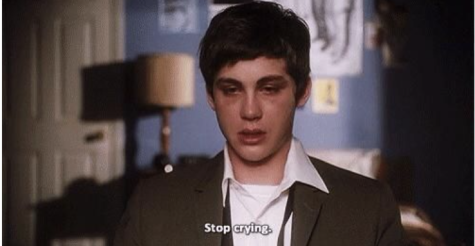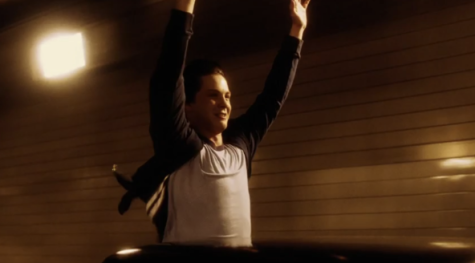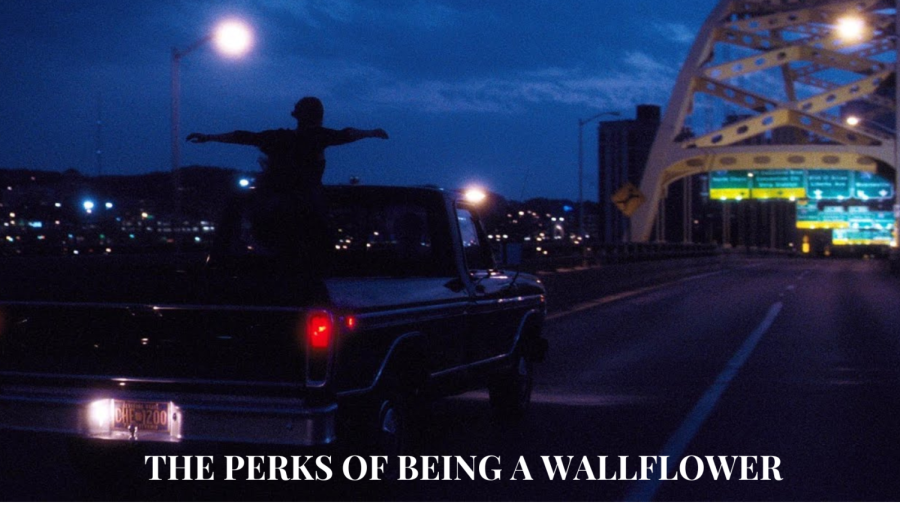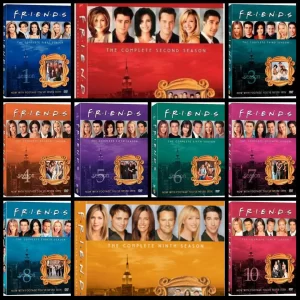Why All Teens Should Watch The Perks of Being a Wallflower
May 3, 2023
There is a recurring pattern within Coming of Age media to portray an inaccurate and romanticized idea of teenage life and perception. When adults attempt to write books and produce movies from the point of view of a teenager, the generational gap and longing for production value becomes apparent; and any teenager watching feels entertained but profoundly misrepresented. However, this makes it all the more impactful when an author can capture the true essence of teenagehood in a way that both moves and consoles the younger audience. The Perks of Being a Wallflower, a Stephen Chbosky novel and film adaptation, is one of these commendable exceptions.
The most praiseworthy aspect of The Perks of Being a Wallflower is its representation of differing mental health illnesses and their impact on teenage life. Chbosky shows how one’s personal insecurities and traumatic experiences can affect their relationships with other people. He focuses not only on the characters’ actions but the reasons behind them, using the characters’ pasts and mental health struggles as an explanation for their choices. His demonstration of these interacting mental health struggles brings a level of relatability to the story, giving viewers more characters to resonate with.
Another thing that makes the film so impactful is its strategic formatting, for the movie is set up so that viewers and the characters discover things simultaneously. At the beginning of the movie, we know very little about the characters, but this is because the characters know very little about themselves. The plot is built upon self-discovery, meaning the characters continuously learn more about themselves and who they are throughout the film. During the film, the characters begin to understand themselves better, allowing the viewer to understand their feelings better. This structure makes the Coming of Age feeling so accurate, for it puts the viewer through the process of self-understanding prevalent in teenage life.
*potential spoilers below*
The movie follows Charlie Kelmeckis, played by Logan Lerman, as he enters high school a shy, socially-awkward kid with trouble making friends. However, he is eventually befriended by seniors Sam Button (played by Emma Watson) and Patrick Button (played by Ezra Miller). Amidst new friendships, Charlie’s social life begins to grow, causing him to see more value in his life. However, throughout the movie, the complexities within Charlie’s past slowly come to light as he struggles with periodic violent blackouts. Eventually, we learn that Charlie’s best friend in middle school had committed suicide, which explains his social anxiety and restraint. However, the main reveal of the story is that of his Aunt Helen, whom he references throughout the movie as his cherished late aunt, a death he feels responsible for. One of the movie’s most impactful and best-acted scenes is toward the end when Charlie has a breakdown after becoming aware that Aunt Helen molested him as a child, memories he had been repressing. Charlie eventually ends up in an in-patient facility, where he comes to terms with his trauma.

However, Charlie is not the only one in the story with PTSD. Sam’s rejection limits Charlie’s crush on Sam; A rejection we learn does not stem from dislike but from her unresolved trauma. She, too, was abused as a child by a family friend; An incident left her feeling desperate for approval, but not always from the right people. Her indifference to Charlie derives from her feeling undeserving of someone good. In relation to Sam’s situation, we get the famously simple line, delivered by Paul Rudd – Charlie’s English teacher – “We accept the love we think we deserve.”
The final character with a notable plot point is Patrick, who struggles throughout the film with sexuality and self-acceptance. Patrick is gay and has a hidden relationship with the closeted quarterback throughout the film. When this relationship gets exposed and broken up, Patrick is sent into a depression and substance abuse spiral as he comes to terms with his rejection and the impact being kept a secret had on his self-esteem. Finally, there’s a heartbreaking scene where Patrick, desperate for any love and acceptance, kisses Charlie and breaks down in tears. Charlie, aware of Patrick’s loneliness, does not fault him but comforts him.
 The significance of having main characters with such unique personalities and challenges is that they allow the film to impact a broader audience. The portrayal of different teenage experiences means viewers can watch the movie and likely find themselves relating to at least one of the characters. In addition, the movie navigates the relationships between these characters, showcasing how personal obstacles can lead to toxic relationships, lack of communication, and comfort within bad situations. It’s important to see interactions amongst different mental states because viewers can observe the contrasting affection and restraint that stems from one’s self-image.
The significance of having main characters with such unique personalities and challenges is that they allow the film to impact a broader audience. The portrayal of different teenage experiences means viewers can watch the movie and likely find themselves relating to at least one of the characters. In addition, the movie navigates the relationships between these characters, showcasing how personal obstacles can lead to toxic relationships, lack of communication, and comfort within bad situations. It’s important to see interactions amongst different mental states because viewers can observe the contrasting affection and restraint that stems from one’s self-image.
“And in this moment, I swear, we are infinite.” The Perks of Being a Wallflower is undeniably a bitterly realistic film that does not shy away from showcasing the hard aspects of teenage life. However, what makes the plot so valuable to a teenage audience is how it ends with a cliffhanger of hope. This quote comes from the movie’s closing scene, a famously referenced line that is recited during a scene of Charlie, after leaving the mental health hospital, reuniting with Sam and Patrick. With Patrick driving, Sam and Charlie take turns standing up on the back of a truck bed driving down a tunnel, which they eventually reach the end of and drive into the city. In other words, the scene provides a metaphorical and physical reminder that there is light at the end of the tunnel.

This scene impacts the audience in such an uplifting way because of the contradictory emotion it provokes compared to the previous half-hour of the film. After the devastating unraveling of Charlie’s story, to have some extremely favorable ending and show Charlie living out a happily-ever-after would feel inconsistent and unfitting. The tunnel scene’s simplicity makes it such a perfect conclusion; instead of showcasing the message “life will always work out,” it showcases the message “life will always go on.” The concept of continuation is more realistic than perfection because it is a reassurance that bad things do not equate to the end of the world. The Perks of Being a Wallflower does a perfect job of realistically balancing darkness with hope. There is no greater consolation than being left with the feeling that the end is nowhere near, and sometimes, everyone needs a reminder that we are infinite.
Impactful Quotes:
- “Enjoy it. Because it’s happening.”
- “So, I guess we are who we are for many reasons. And maybe we’ll never know most of them. But even if we don’t have the power to choose where we come from, we can still choose where we go from there. We can still do things. And we can try to feel okay about them.”
- “We accept the love we think we deserve.”
- “So, this is my life. And I want you to know that I am both happy and sad and I’m still trying to figure out how that could be.”
- “I think that if I ever have kids, and they are upset, I won’t tell them that people are starving in China or anything like that because it wouldn’t change the fact that they were upset. And even if somebody else has it much worse, that doesn’t really change the fact that you have what you have.”
- “I am very interested and fascinated how everyone loves each other, but no one really likes each other.”
- “It’s just that I don’t want to be somebody’s crush. If somebody likes me, I want them to like the real me, not what they think I am. And I don’t want them to carry it around inside. I want them to show me, so I can feel it too.”
- “He’s a wallflower. You see things. You keep quiet about them. And you understand.” – Patrick
- “We didn’t talk about anything heavy or light. We were just there together. And that was enough”
- “And I guess I realized at that moment that I really did love her. Because there was nothing to gain, and that didn’t matter.”
- “Please believe that things are good with me, and even when they’re not, they will be soon enough. And I will always believe the same about you.”
- “Maybe it’s good to put things in perspective, but sometimes, I think that the only perspective is to really be there. Because it’s okay to feel things. I was really there. And that was enough to make me feel infinite. I feel infinite.”
- “There’s nothing like deep breaths after laughing that hard. Nothing in the world is like a sore stomach for the right reasons.”









